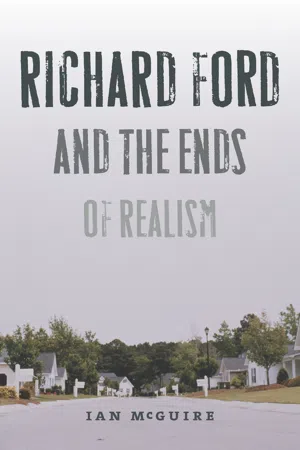
- English
- PDF
- Available on iOS & Android
Richard Ford and the Ends of Realism
About This Book
Richard Ford and the Ends of Realism examines the work of award-winning American novelist and short story writer Richard Ford, and places it firmly in the context of contemporary debates about the role and meaning of literary realism in a postmodern environment. In this fresh study of Ford's oeuvre, Ian McGuire argues that Ford's work is best understood as a form of pragmatic realism and thus positions him as part of a deeply rooted and ongoing American debate about the nature of realism and pragmatism. This debate, which reaches back to transcendentalist thinkers such as Ralph Waldo Emerson and continues on to today, questions the meaning of independence and the relationship between the self and history. In this context, McGuire explores Ford's deep engagement with American literary and philosophical traditions and repositions his work in its appropriate intellectual and literary context.McGuire also uses this idea of pragmatic realism to mount a larger defense of contemporary realist writing and uses Ford's example to argue that realism itself remains a useful and necessary critical category. Contemporary realism, rather than being merely conventional or reactionary, as some of its critics have called it, can offer its proponents an aesthetically and philosophically sophisticated way of engaging with and contesting the particularities of contemporary, even postmodern, experience.In offering this new reading of Richard Ford's fiction, as well as a fresh understanding of the realist impulse in contemporary American fiction, both become richer, more resonant, and more immediate—reaching both backward into the past and forward to involve themselves in important contemporary debates about history, postmodernity, and moral relativism.
Frequently asked questions
Information
Table of contents
- Contents
- Acknowledgments
- Introduction. “This Balancing of Urgent Forces”: Richard Ford’s Pragmatic Realism
- One. The Lie of Literature and the Work of Mourning: The Sportswriter and Rock Springs
- Two. Independence Day and the Limits of Pragmatism
- Three. “Spoiled People”: Narcissism and the Decentered Self in Women with Men
- Four. “What Was That Thing She Was?”: Realism, Postmodernism, and the Fragmented Body in A Multitude of Sins
- Five. “Everything Good Is on the Highway”: Permanence and Transition in The Lay of the Land
- Conclusion. Canada and the Hazards of Normality
- Notes
- Bibliography
- Index